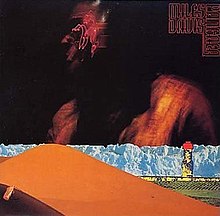Pangaea (album)
| Pangaea | ||||
|---|---|---|---|---|
 |
||||
| Live album by Miles Davis | ||||
| Released | 1976 | |||
| Recorded | February 1, 1975 | |||
| Venue | Festival Hall in Osaka | |||
| Genre | Jazz-rock,funk | |||
| Length | 88:38 | |||
| Label | Columbia | |||
| Producer | Teo Macero | |||
| Miles Davis chronology | ||||
|
||||
| Professional ratings | |
|---|---|
| Review scores | |
| Source | Rating |
| AllMusic | |
| Christgau's Consumer Guide | |
| Down Beat | |
| Encyclopedia of Popular Music | |
| The Great Rock Discography | 6/10 |
| Los Angeles Times | |
| MusicHound Jazz | 5/5 |
| The Penguin Guide to Jazz | |
| The Rolling Stone Album Guide | |
Pangaea is a double album recorded by jazz trumpeter Miles Davis. It was originally released in 1976, exclusively in Japan. Both Pangaea and its predecessor Agharta (1975) were recorded on February 1, in Osaka, Japan, at the Festival Hall. The Agharta concert took place during an afternoon , whereas Pangaea was recorded in the evening.
The album's music was split into two tracks, "Zimbabwe" and "Gondwana", the latter of which was the name of the ancient supercontinent, as was "Pangaea". According to music scholar Enrico Merlin, the two tracks contain performances of the segments originally developed by Davis under the titles "Moja", "Willie Nelson on Tune in 5", "Nne", "Zimbabwe", "Ife", and "Wili (= for Dave)", performed in that order.
Like Agharta, Pangaea was originally released in Japan in 1975, after Davis retired from music. The 1975 Japanese-edition LP released by CBS/Sony included a 7-page booklet with photos and Japanese text. It was digitally remastered in 1990 and released for the first time in the United States as part of the Columbia Jazz Contemporary Masters CD series.
In The Village Voice, Robert Christgau gave Pangaea an honorable mention, citing "Zimbabwe" as the highlight while lamenting the flute playing and scant track listing. Davis biographer Jack Chambers found it "vastly" inferior to Agharta, as did Paul Tingen, who lamented Davis' reduced presence and role directing his septet. He also observed "a sense of tiredness and drift" from having played the first concert that day: "There are several extended periods during which the band just plays out the grooves, waiting for Miles to give the next cue." In the Los Angeles Times, Bill Kohlhaase called Pangaea "a striking personal soundtrack of decline that, like Miles himself, suffers from exhaustion before playing itself out".
...
Wikipedia
